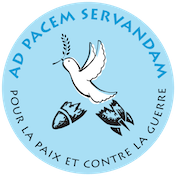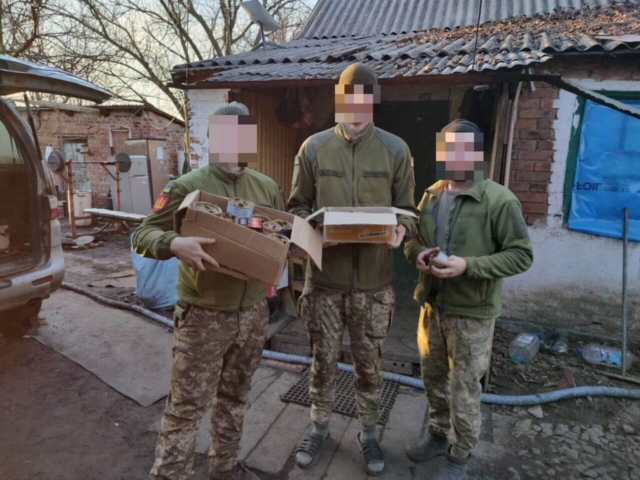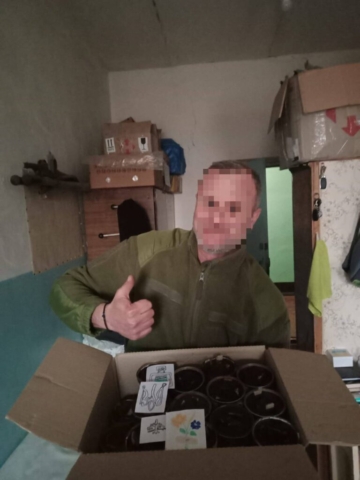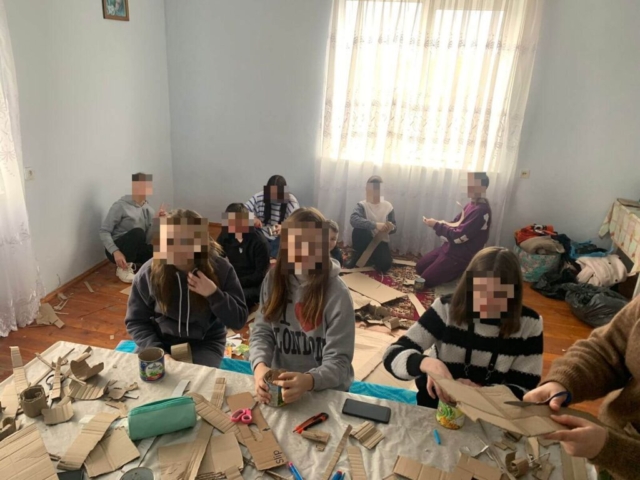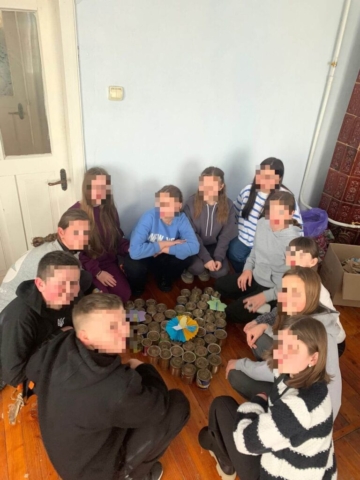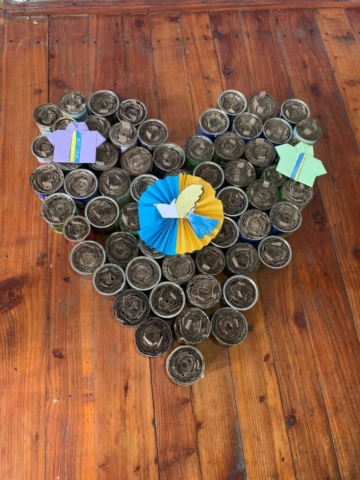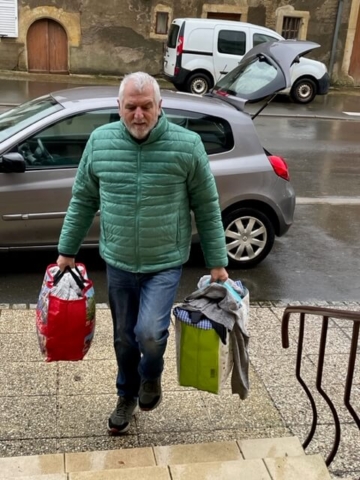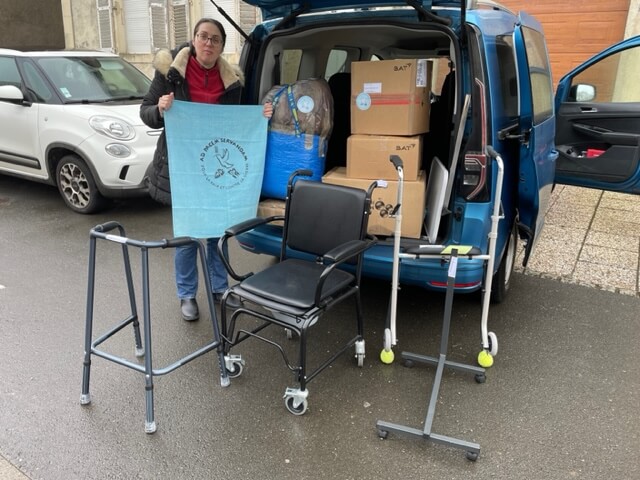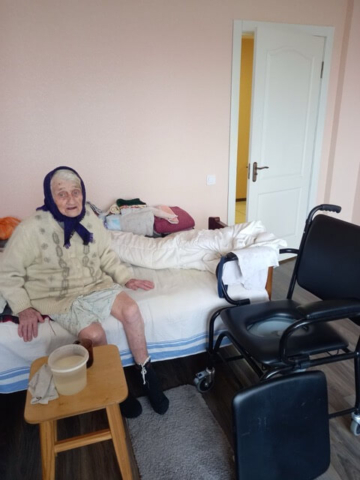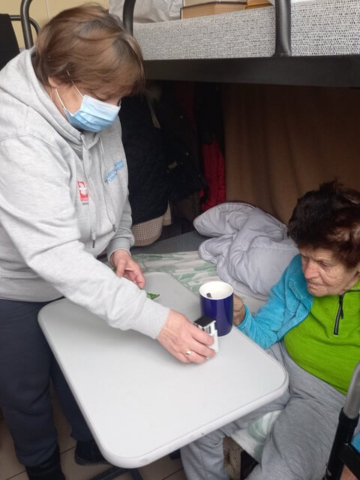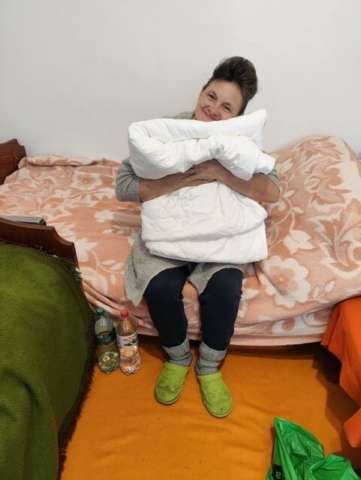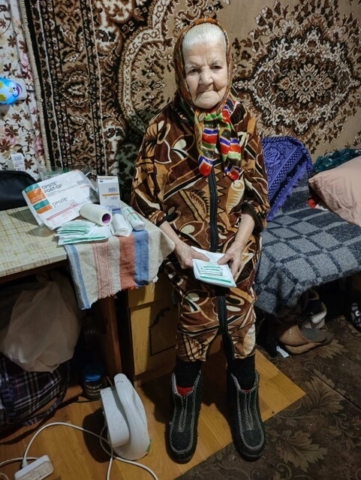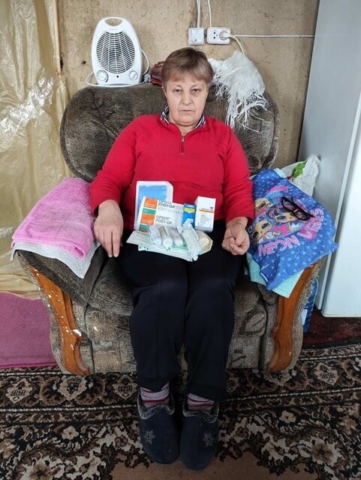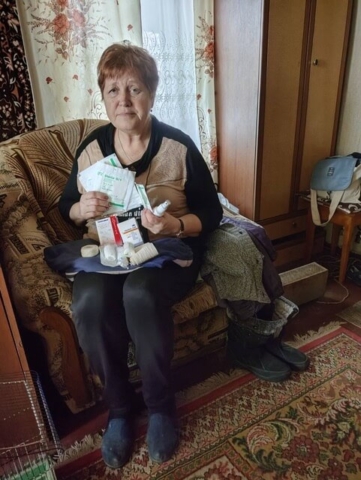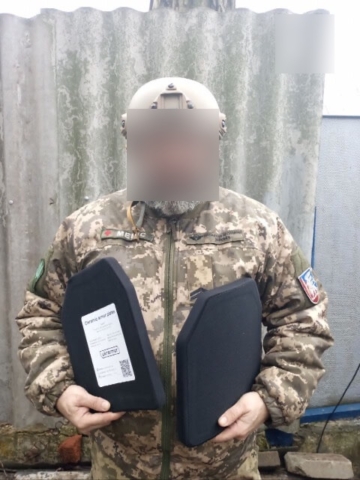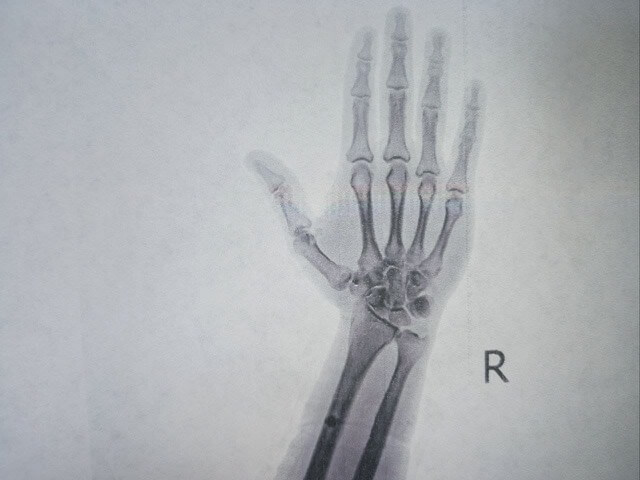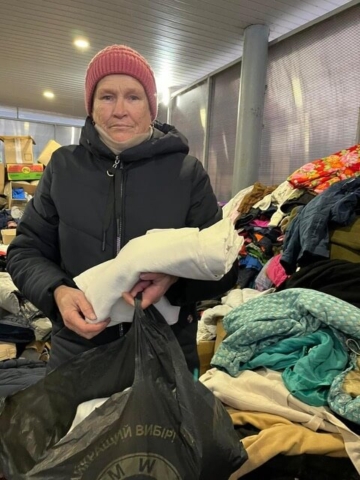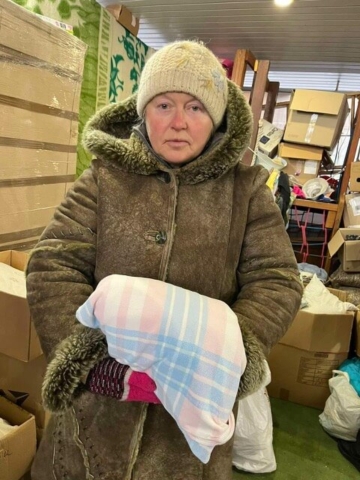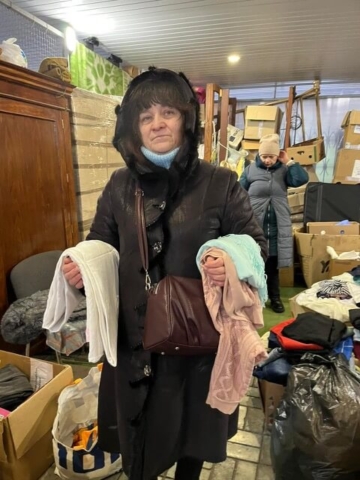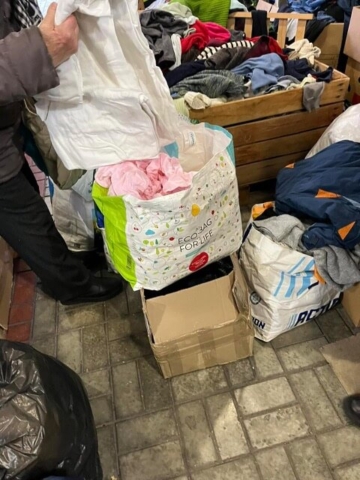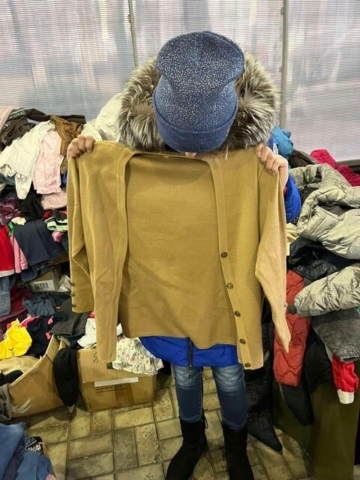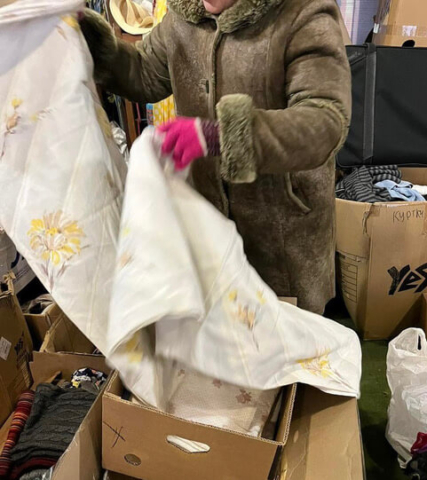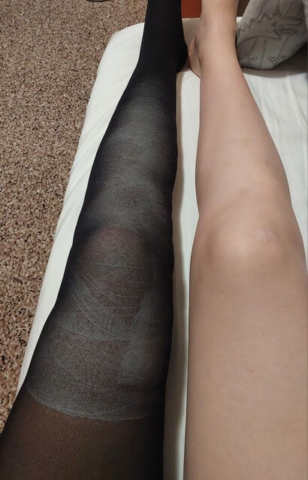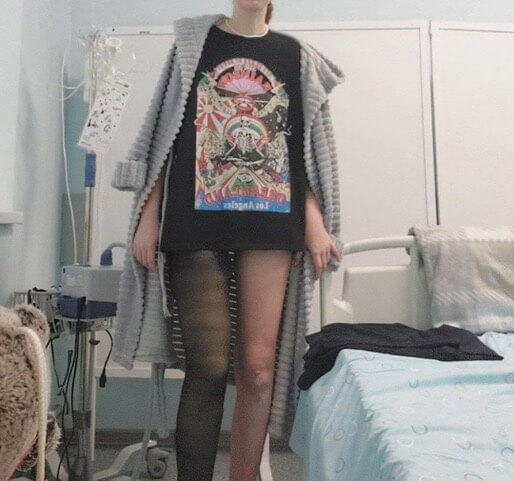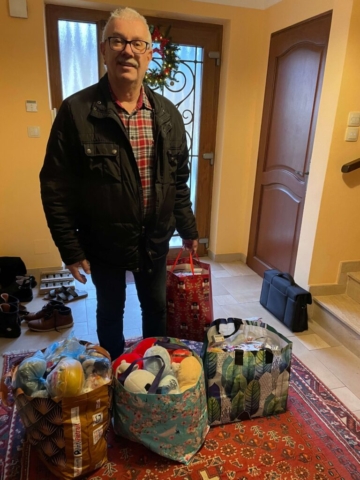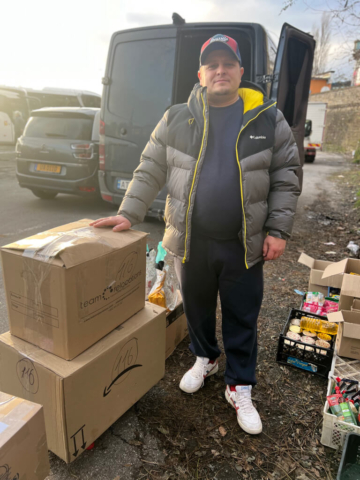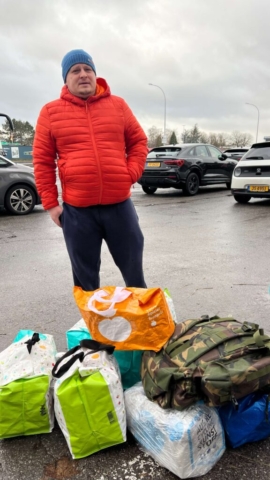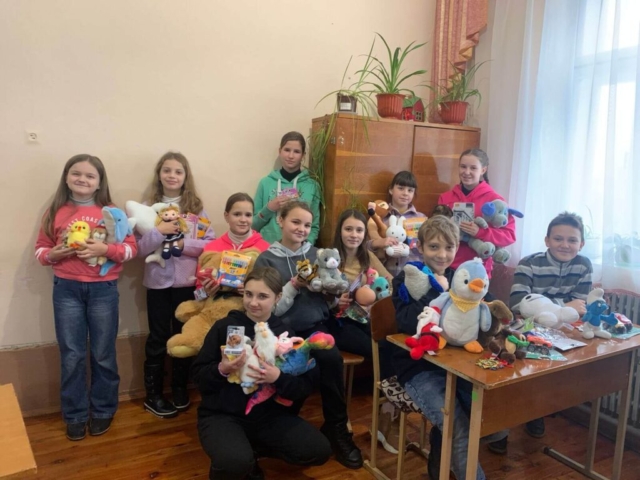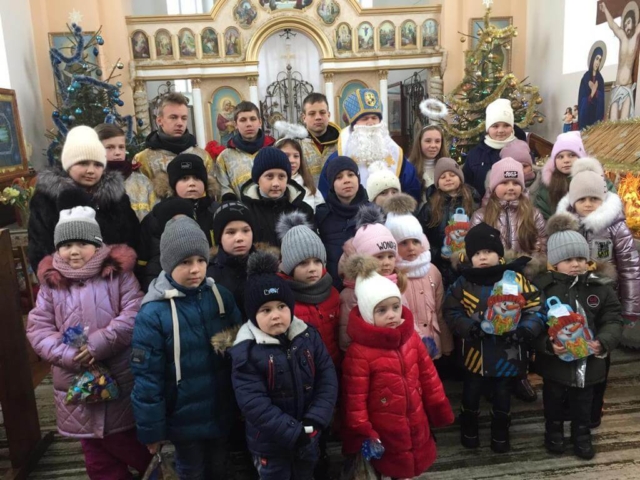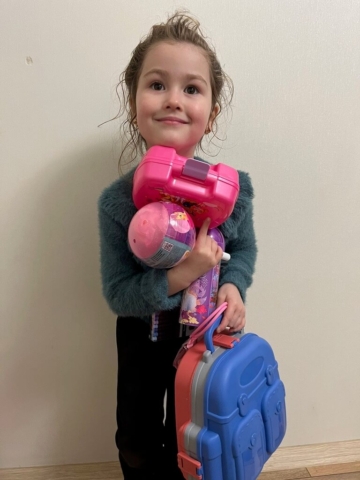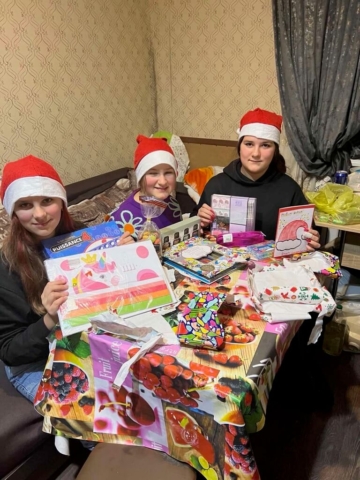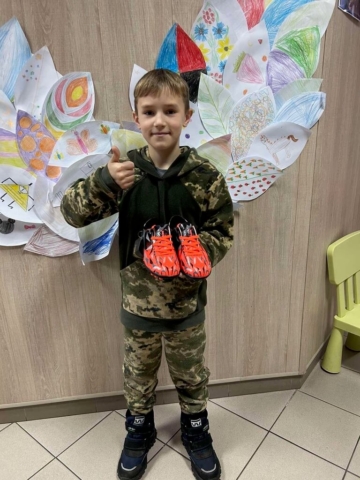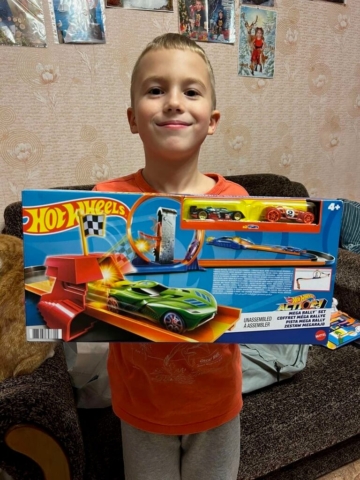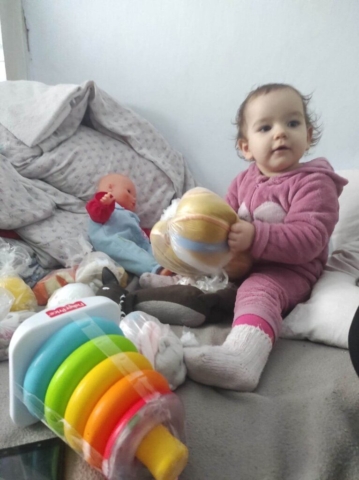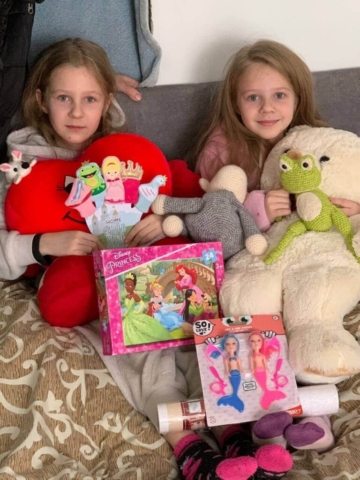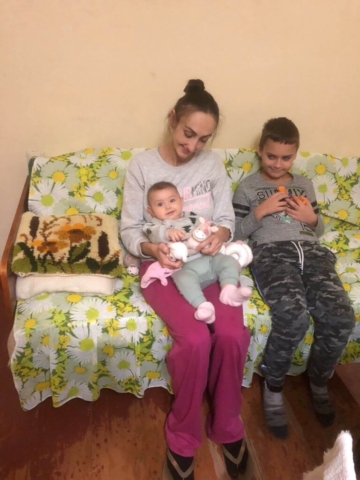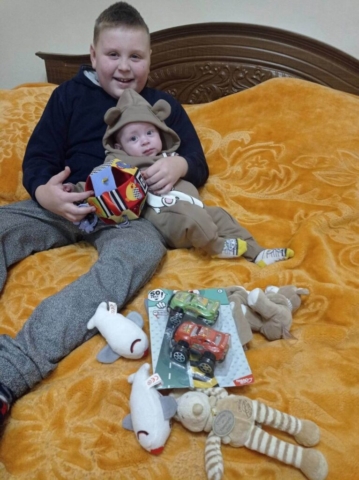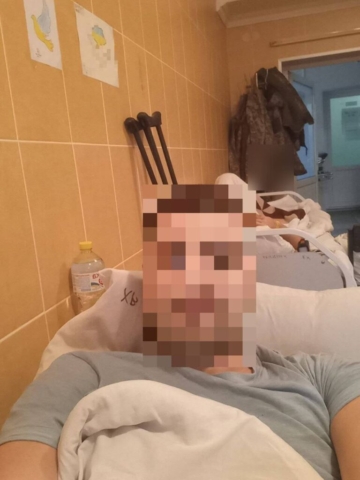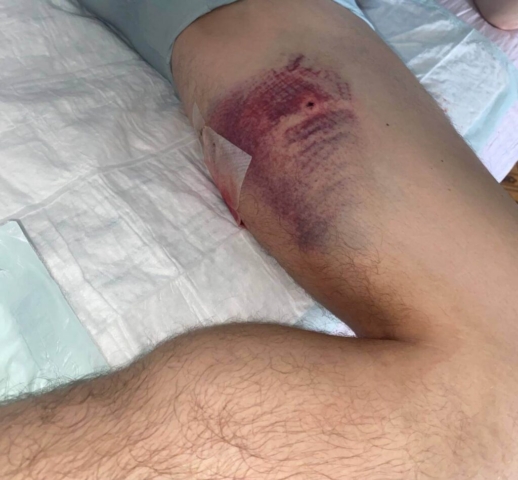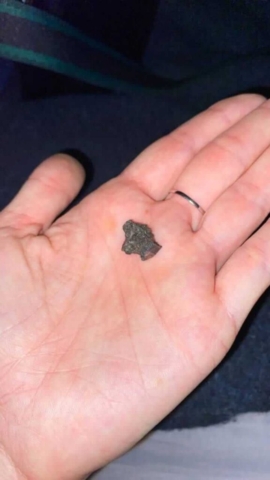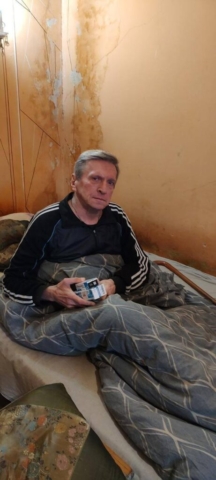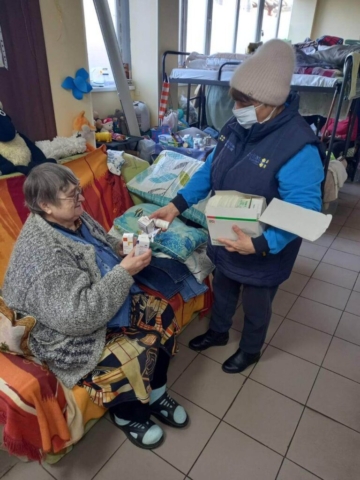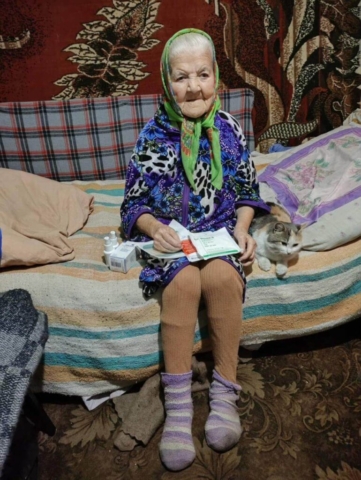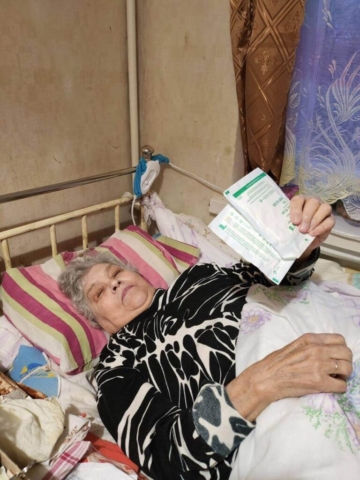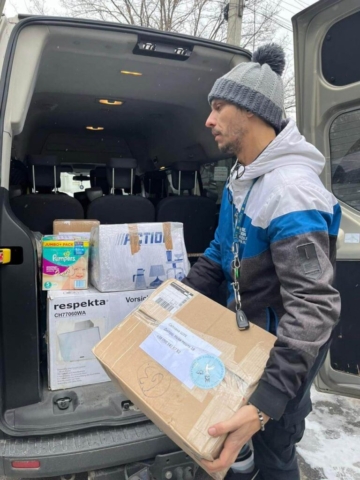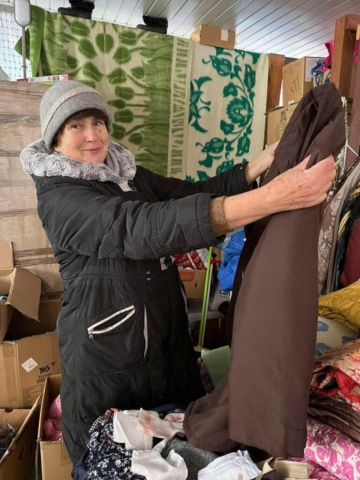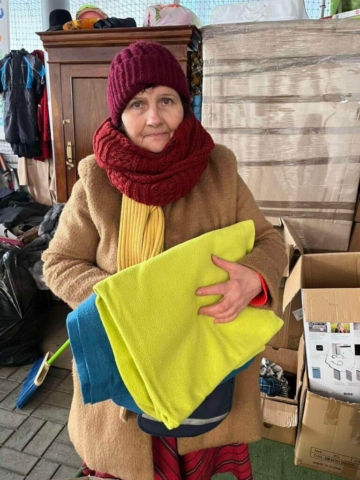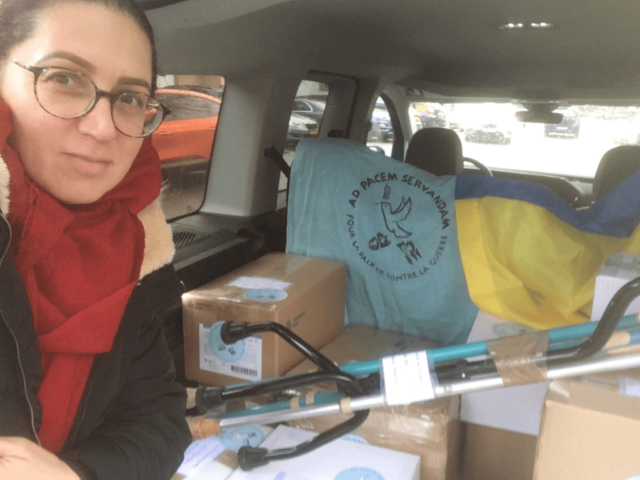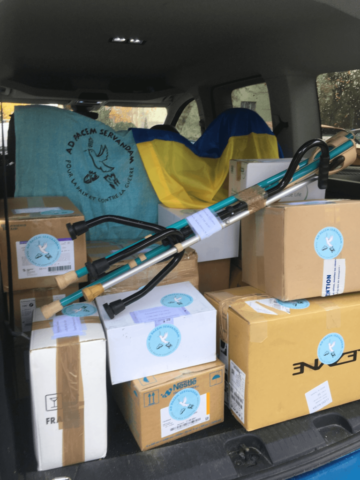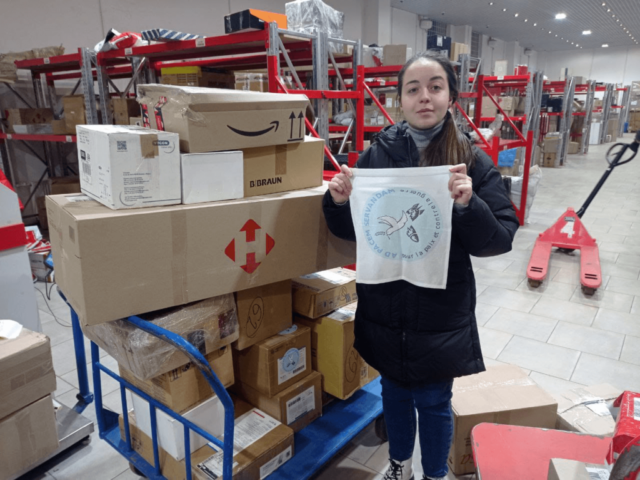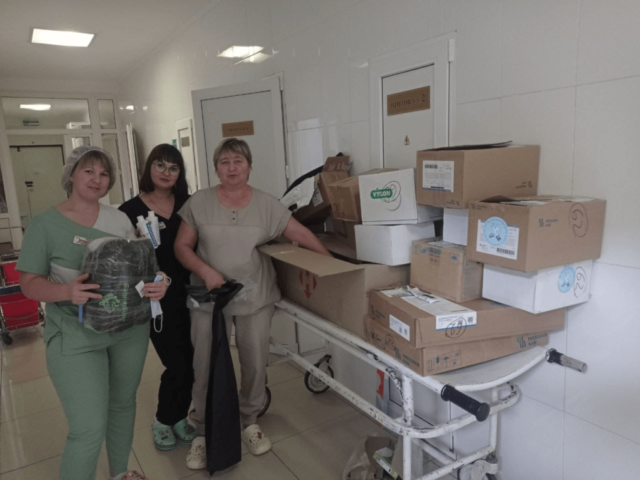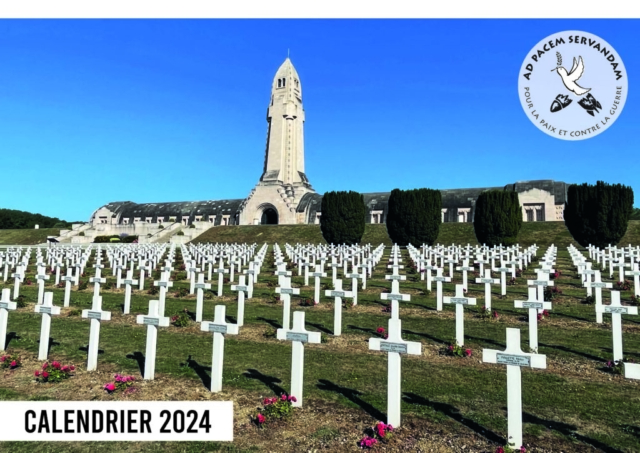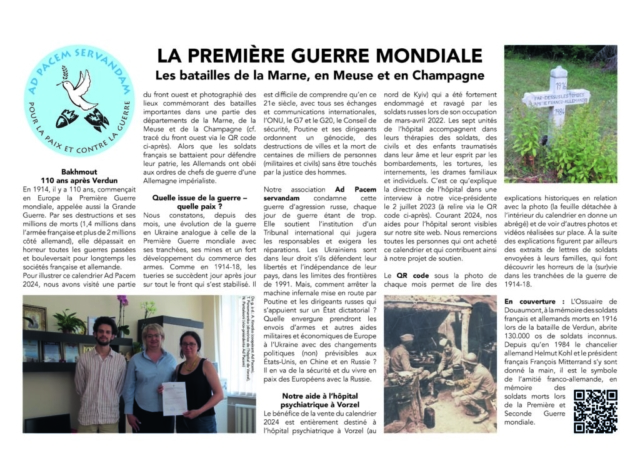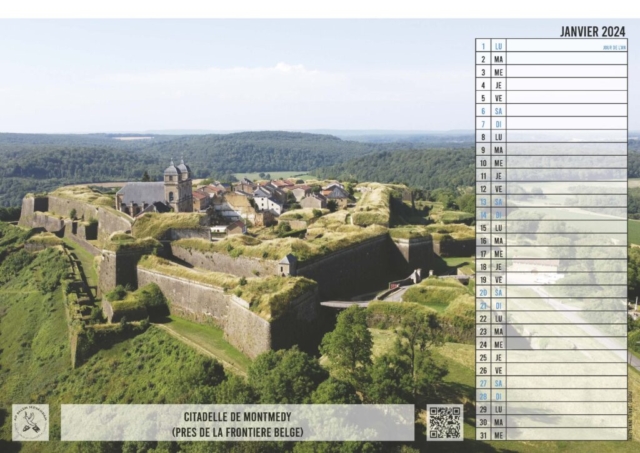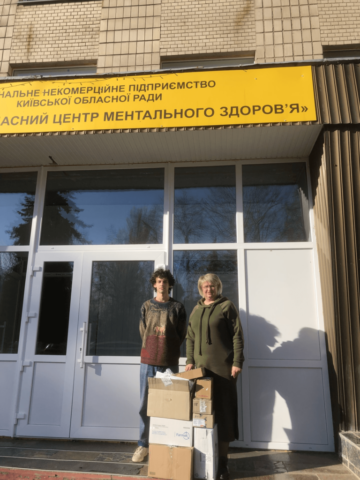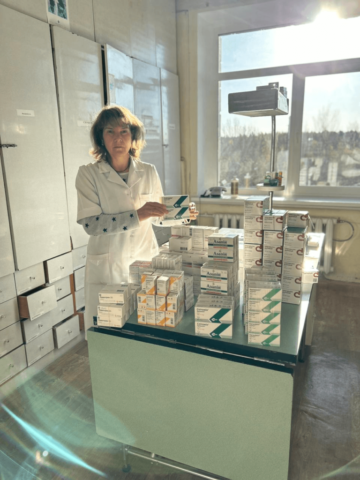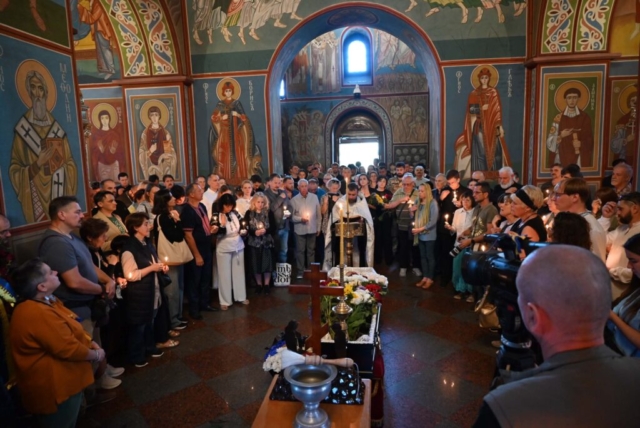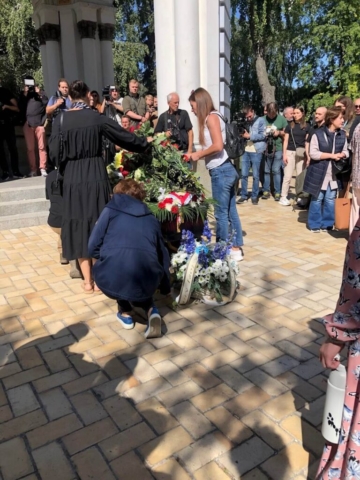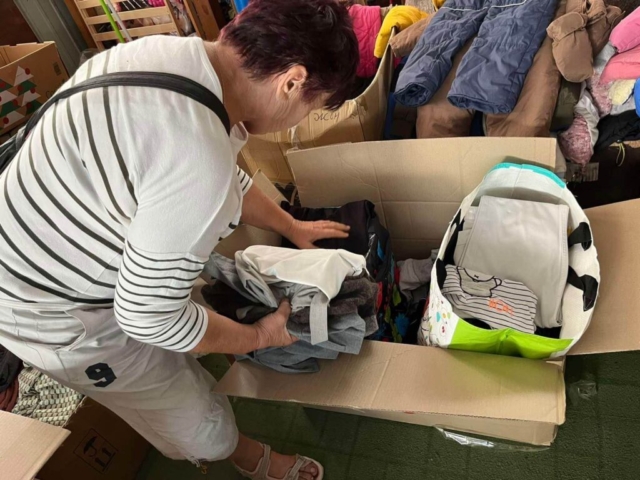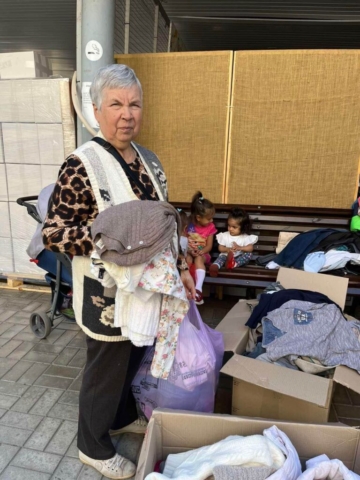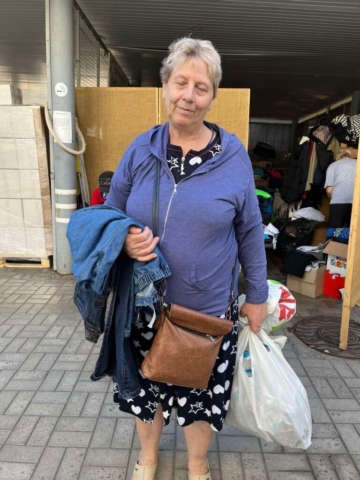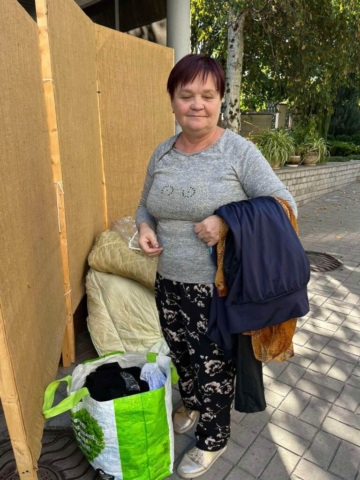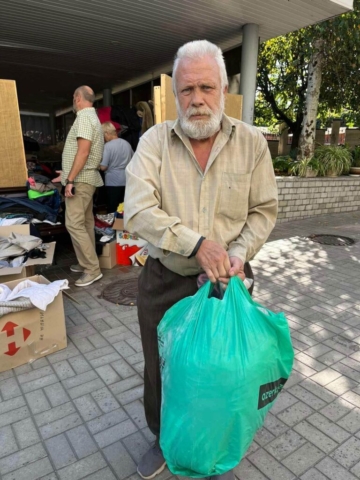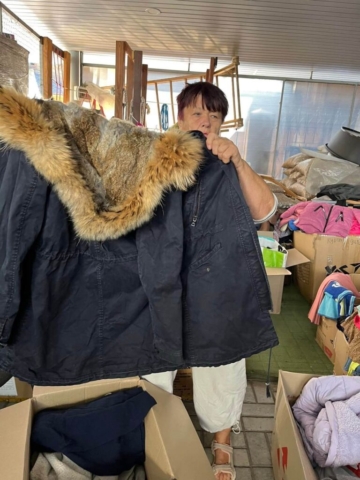Production of trench candles by the children of Berezhany. The paraffin for the candles was bought by our association in Ukraine. Once made, the candles were delivered at the end of January to the soldiers at the front. In the trenches, they are used to heat food, warm cold hands, provide some light, dry small items of clothing, etc.
3 and 17 February 2024: on 3 February, a wheelchair, a walking frame, a table that can be hung next to the patient’s bed, linen, blankets and medicines were sent from Luxembourg to the centre for internal refugees in Dnipro. This aid arrived on the 17th of the month.
5 January 2024: Oleksadr P., a doctor at the front near Bahmut, received a bullet-proof waistcoat and protective belt from our association. As early as 18 January, when he went out to help the wounded, he was only slightly wounded in the hand and was operated on at Poltava hospital. He stayed alive thanks to the protection he had received a few days earlier.His wife wrote us a letter of thanks: “You saved the father of our children. While Oleksandr was in hospital, his third child, a daughter, was born”.
5 January 2024: the internal refugees at the Dnipro refugee centre received our help: bed linen and winter clothes sent from Luxembourg on 23 December.
30 December 2023: our association Ad Pacem has financed a surgical operation for the young student Maria S. A tumour was removed from her left leg. It was an abnormal form of varicosis. Maria and her mother Inga would like to thank all Ad Pacem members for their help. In her letter, Inga writes: “We are internal refugees from Kramatorsk and are currently living in a hostel in Kropivnyckij (central Ukraine). We lost our house in Kramatorsk (due to the war). My daughter is now studying distance learning at the University of Odesa. In the summer of 2023, a tumour formed on her left leg below the knee and varicose veins were discovered during an examination. The doctor recommended removing them surgically. But the cost of the operation was too high for me as I am bringing up my daughter alone. Thanks to the help of Ad pacem, this necessary operation was possible. And my daughter will be healthy again”.
Newsletter 30
When is the next war in the Balkans?
Dear friends, dear members,
Since the beginning of 2022, new wars in Ukraine, Nagorno-Karabakh, Sudan and Gaza have dominated our daily news.
To find out where the next armed conflict in Europe might break out, on behalf of our association Ad Pacem servandam – Pour la Paix et contre la guerre I invite you to attend our conference with Mr Jean-Arnault Dérens, which will take place on Saturday 24 February 2024 at LuxExpo – The Box in Kirchberg (Luxembourg City), from 2.30 to 4.00 pm in the ground floor room, as part of the Festival des Migrations and the Salon du Livre organised by CLAE.
Some regions of the Balkans may soon be seeking a military solution to their border problems and disputed territorial occupations. This is still in the wake of the collapse of the former Yugoslavia and the wars of independence in the 1990s.
To find out more about this region at the heart of Europe, we invited journalist and historian Jean-Arnault Dérens, who has been reporting on the Balkans for a quarter of a century in the online newspaper Le Courrier des Balkans, of which he is editor-in-chief and also co-founder.
His lecture on Saturday 24 February is entitled:
“The Balkans, a marginalised periphery of the European Union? Old unresolved conflicts and new actors”
After the lecture, the author will sign his books, which can be purchased on site.
Admission is free.
We look forward to seeing you at the event,
best regards,
Claude Pantaleoni
Chairman
On 18 and 25 November and 2 December 2024, several consignments of toys and gifts were sent from Luxembourg to the refugee centres in Dnipro and Berzhany. Our packages arrived in Dnipro on 22 and 29 November and in Berezhany on 5 December, just in time for St Nicholas’ Day and Christmas.
The team of doctors at the field hospital who received our helmets and bullet-proof waistcoats at the beginning of April 2023 also included Oleg, a first-aid nurse. On 6 December 2023, Oleg sent us a text message and photos of himself in hospital. In his message he wrote: “At the start of the Russian invasion of Ukraine, I, like many of my school colleagues, changed classes and went to the front as a first-aid nurse to help our soldiers liberate our country from the Russian invaders. On 1 December 2023, we were carrying wounded soldiers off the battlefield when we came under fire. I was hit by projectiles, but saved thanks to God’s help and the bullet-proof waistcoat and helmet that you bought for me. Please accept my sincere thanks on the occasion of today, the Feast of St Nicholas, and I wish you all a long life!”
Sent on 18 and received on 29 November 2023: our aid for internal refugees in Dnipro: bed linen, blankets and cushions, warm clothing, various medicines
Sent from Luxembourg on 25 Nov. and received on 6 Dec. 2023 in Kharkiv: dressings, painkillers, disinfectants, orthoses for knees, hands and feet, enteral feeding, crutches.
Newsletter 28
Peace above all
Dear friends,
As in all wars, the war between Israel and Hamas is mainly killing innocent civilians. Once again, we are witnessing the powerlessness of the world’s leaders to stop it or impose a ceasefire.
But as long as the Israeli and Palestinian leaders do not join hands to live in peace in two neighbouring states, recognising each other, the region will remain an area of conflict.
Our association supports any initiative that stops the war and leads to lasting peace between Israelis and Palestinians.
Publication: Ad Pacem 2024 calendar
Our new Ad Pacem calendar for 2024 has been available for a few days now. To produce it, this summer we travelled between Verdun and Reims, along the Western Front of the First World War. More specifically, we visited the sites of the great battles of the Meuse, Champagne, and Marne. And we compare this front to the Russian-Ukrainian front, which has been bogged down and stagnant for months. QR codes and a leaflet inside the calendar provide additional information and photos.
Proceeds from the sale of the calendar will go to help the psychiatric hospital in Vorzel, north of Kyiv, which our Vice-President visited last July. Director Tetyana Ponomarenko explained to her how the hospital was ransacked by Russian soldiers in March-April 2022. Today, the hospital is mainly short of medicines to treat the soldiers and Ukrainian civilians traumatised by the war, who are constantly flocking there.
You can order our Ad Pacem 2024 calendar by paying €14 into our account LU28 0099 7800 0064 0276 (CCRALULL), clearly specifying your full name and postal address.
Thank you
I would like to thank all our members who responded to our appeal for donations in Newsletter 27 to organise the purchase of essential medicines for the psychiatric clinic in Vorzel. These were handed over to the Director on 14 November 2023.
=> 14 November 2023. On 30 October 2023, the Vorzel psychiatric hospital in Ukraine received the medicines purchased thanks to donations received following our appeal in Newsletter 27. The hospital obtained antidepressants, neuroleptics, anticonvulsants, hynoptics and anxiolytics.
Best wishes for peace!
Claude Pantaleoni
Chairman
14 November 2023. On 30 October 2023, the Vorzel psychiatric hospital in Ukraine received the medicines purchased thanks to donations received following our appeal in Newsletter 27. The hospital obtained antidepressants, neuroleptics, anticonvulsants, hynoptics and anxiolytics.
Death of Ihor Kozlovsky
Ihor Kozlovsky, a Ukrainian historian and researcher in religious studies, died of a heart attack on 6 September 2023 in Kyiv.
Kozlovsky was 69 years old. He was originally from the Donetsk region. Even after the Russian invasion in 2014, he never left his home town. On 27 January 2016, militants from the so-called Donetsk People’s Republic took him prisoner because of his pro-Ukrainian stance. Kozlovsky remained in captivity for 700 days, where he was subjected to numerous tortures. He was released in a prisoner exchange on 27 December 2017.
After his return to Ukraine, he worked in Kyiv in the Religious Studies Department of the Institute of Philosophy of the Ukrainian National Academy of Sciences.
Invited in October 2021 by our association “Ad pacem servandam – For Peace and Against War”, Ihor Kozlovsky travelled to France, Luxembourg and Germany to bear personal witness to Russian war crimes against civilians in Ukraine. He gave several interviews to German, Luxembourg and French journalists.
You can watch the lecture Ihor Kozlovsky gave in Mont-Saint-Martin (F) on 16 October 2021 by clicking on the following link:
War in Ukraine. 700 days of captivity and torture. Ihor Kozlovsky testifies
Newsletter 27
War in Ukraine – Appeal for donations
Dear friends,
During the first months of 2022, when Russia invaded Ukraine, we made several appeals, via our Newsletter, to help Ukrainian refugees inside their country and those arriving here.
You were generous enough to bring us sheets, blankets, clothes, shoes, food and medicines, which we sent to Ukraine in successive consignments to our development workers, who distributed them to those in need.
Many of you have made donations by bank transfer, with which we have purchased in Ukraine throughout the year what the refugees in the various reception centres and the wounded soldiers in the hospitals in Kharkiv and Kramatorsk needed, with whom we remain in contact.
The “Russia’s war against Ukraine” section of our website brings together all our direct aid actions. You can find out where, when and by whom this aid has been received.
=> Russia’s war against Ukraine
Psychologically traumatised people –
the forgotten victims of this war
Today, we are coming back to you with this URGENT APPEAL to help a psychiatric clinic in Vorzel, north of Kyiv, which our vice-president Natalya Pantaleoni visited at the end of June – beginning of July 2023.
This hospital, which is overloaded with civilian and military trauma patients, can no longer accommodate any more, although patients continue to arrive in large numbers.
There are not enough qualified staff or adequate medicines, as the Ukrainian government is mainly supporting military offensives and the physically injured.
What’s more, the clinic in Vorzel was ravaged and badly damaged by Russian soldiers who occupied it in March-April 2022. To date, it has not been possible to repair the damage due to a lack of funds.
Our vice-president’s interview with the director Tetyana Ponomarenko explains everything.
=> Interview
You can help by making a donation to our bank account
IBAN LU28 0099 7800 0064 0276 (CCRALULL)
of our association “Pour la Paix et contre la Guerre asbl”
with the mention “Help Vorzel”
or by using => Payconiq (only Benelux)
All our actions are documented and can be seen on our website.
If you have any medical equipment (crutches, walkers, medical corsets, wheelchairs, etc.) that you no longer need, we can collect it and send it to hospitals in Kharkiv and Kramatorsk.
Contact us by email at [email protected].
On behalf of the war victims and traumatised patients at Vorzel hospital,
many thanks!
Claude Pantaleoni
Chairman

